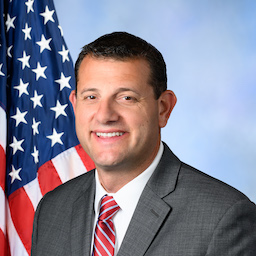- Home
- About
-
Services
- Art Competition
- Community Project Funding Map
- Congressional App Contest
- Congressional Certificate
- Event Request
- Flag Request
- Grants
- Grant Letters of Support
- Help with a Federal Agency
- Inauguration
- Internships
- Kids Page
- Meeting Request
- Service Academy Nominations
- Tour Requests
- Vietnam Veteran Commemoration
- Government Shutdown FAQ
- Issues
- Media
- Contact

Press Releases
Congressman Valadao Introduces Bill to Expand Access to Supplemental Oxygen
Washington,
April 10, 2025
|
Paige Ash
Tags:
Health Care
Today, Congressman David Valadao (CA-22) reintroduced the Supplemental Oxygen Access Reform (SOAR) Act alongside Reps. Julia Brownley (CA-26), Adrian Smith (NE-03), and Gabe Evans (CO-08).
WASHINGTON – Today, Congressman David Valadao (CA-22) reintroduced the Supplemental Oxygen Access Reform (SOAR) Act alongside Reps. Julia Brownley (CA-26), Adrian Smith (NE-03), and Gabe Evans (CO-08). This bipartisan, bicameral bill makes critical reforms to improve access to supplemental oxygen for Medicare beneficiaries. The Senate companion bill is led by Senators Bill Cassidy (R-IL), Mark Warner (D-VA), and Amy Klobuchar (D-MN). “Supplemental oxygen is lifesaving, but many people struggle to get access due to burdensome Medicare requirements,” said Congressman Valadao. “The SOAR Act makes it easier for people to get the oxygen treatment they need to live healthy, active lives. I want to thank my colleagues for joining me in the fight to ensure the availability of this critical medical resource.” “No one should have to struggle to breathe, yet millions of seniors face this difficult and frightening reality every day,” said Rep. Brownley. “This legislation will ensure that over 1.5 million Americans who rely on supplemental oxygen have access to the care and portable oxygen they need, helping them to lead healthier, more active lives.” "Patients who need supplemental oxygen treatments face significant barriers to care, especially in rural areas like Nebraska’s Third District where long driving distances are required to access respiratory treatment,” said Rep. Smith. “This bipartisan bill would improve quality of life and outcomes for these patients by allowing Medicare coverage flexibility for beneficiaries who depend on supplemental oxygen. I thank Rep. Valadao and my other colleagues for working together to reintroduce it.” “As a parent whose child has relied on supplemental oxygen in Colorado's high-altitude environment, I know firsthand how critical access to it is,” said Rep. Evans. “I'm proud to cosponsor the SOAR Act to ensure patients in rural communities across Colorado District 8 and the nation get the care they need— without unnecessary barriers.” “Thank you to the SOAR Act’s champions. For more than a million people living with chronic lung disease, access to the right type of supplemental oxygen is not just a necessity; it is their lifeline. It allows them to attend family gatherings, go to medical appointments and even complete daily activities like going to the grocery store. Unfortunately, too many people face challenges in getting the right type and levels of oxygen. The bipartisan, bicameral SOAR Act offers a critical solution by ensuring access to the appropriate supplemental oxygen for all who depend on it. This truly lifechanging legislation is needed now more than ever, and we urge Congress to swiftly pass the SOAR Act,” said Harold Wimmer, President and CEO of the American Lung Association. "The reintroduction of the Supplemental Oxygen Access Reform Act (SOAR) marks a critical step forward in ensuring Medicare beneficiaries have access to life-sustaining supplemental oxygen and the expertise of respiratory therapists in the home setting," said Dana Evans, MHA, RRT, RRT-NPS, President of the American Association for Respiratory Care (AARC). "This legislation addresses long-standing challenges caused by inadequate Medicare reimbursement and limited access to skilled respiratory care professionals. By establishing a new payment methodology for liquid oxygen and prioritizing patient access to respiratory therapists, the SOAR Act is essential for improving the quality of life and health outcomes for more than 1.5 million Americans who depend on supplemental oxygen. Together with our coalition partners, we remain committed to turning this legislation into law and ensuring that all patients receive the respiratory care they need to live fuller, healthier lives.” “Pulmonary hypertension is a progressive, fatal lung disease that impacts individuals of every age, including children and young adults and is characterized by shortness of breath and fatigue. People with PH often need high-flow supplemental oxygen, more than is provided by a portable oxygen concentrator, to continue basic daily activities such as medical appointments, grocery shopping and family visits. The disappearance of liquid oxygen from the market leaves these already short-of-breath individuals burdened with larger oxygen tanks they may not be able to lift, effectively leaving them house bound. By maximizing medically appropriate access to all forms of supplemental oxygen, the SOAR Act allows people with pulmonary hypertension the freedom to return to their everyday activities and life healthier, happier, more independent lives,” said Matt J. Granato, LL.M., MBA, President & CEO, Pulmonary Hypertension Association. “The COPD Foundation thanks Senator Cassidy for his sponsorship of the SOAR Act and his leadership on the urgent need for Medicare supplemental oxygen reform. Our advocates will work tirelessly with him to ensure this bill becomes law in 2025. The time is now to make sure people with COPD have access to this essential care,” said Jean Wright, MD, MBA, Chief Executive Officer of the COPD Foundation. "Filling an oxygen prescription should be as straightforward as picking up medication from the pharmacy, but for patients, it’s an uphill battle fraught with obstacles and delays," said Scott Staszak, President and CEO of the Pulmonary Fibrosis Foundation. "We are deeply grateful to Senate and House co-sponsors for championing oxygen reform legislation, giving Americans the chance to breathe easier and live more fully." "It is important to see this bill brought back in front of Congress for approval," says John Howington, MD, MBA, FCCP, President of the American College of Chest Physicians. "As an organization of pulmonary experts, we see firsthand the suffering of those with severe chronic lung diseases, like interstitial lung disease, who lack sufficient access to necessary oxygen therapies. We need the support of Congress to improve the quality of life of the 1.5 million patients who will benefit from access to supplemental oxygen through this bill.” "As a California lung transplant pulmonologist based in the San Francisco Bay Area, I know from firsthand experience that the Medicare supplemental oxygen benefit is not serving my patients well. The patients I care for have advanced lung disease, and in the pre-transplant period they frequently require much higher oxygen flow rates than portable oxygen concentrators can deliver. Due to a near collapse of the oxygen market, my patients now rely on very heavy and inefficient oxygen canisters when they leave their homes, putting them at constant risk of running out of oxygen. In essence, the current Medicare supplemental oxygen benefit entraps them at home and prevents them from leading productive lives. The legislation introduced by Rep. Valadao, Rep. Brownley and colleagues will make essential changes to the Medicare supplemental oxygen benefit that will help my patients and will provide greater access to higher quality supplemental oxygen systems. I am grateful for the leadership of Rep. Valadao and Rep. Brownley and urge Congress to quickly pass this legislation," said Nicholas A. Kolaitis MD MAS , California physician and member of the ATS Health Policy Committee. “The CQRC applauds Senate and House sponsors for the prompt reintroduction of the SOAR Act in the 119th Congress to maintain and stabilize reimbursement rates for supplemental oxygen supplies and services. This legislation will also ensure enhanced respiratory and pulmonary care access, including increased access to high flow modalities for patients to improve independence and quality of life,” said Robin L. Menchen, President and CEO of Rotech Healthcare and a Council for Quality Respiratory Care (CQRC) Board Member. “We look forward to continuing our advocacy for this important legislation to build upon the momentum the SOAR Act had in the previous Congress to ensure it is passed this year.” Background: Currently, Medicare covers oxygen as a durable medical equipment (DME) benefit for patients who experience oxygen desaturation, a lower level of oxygen in the blood due to lung disease or other chronic conditions. Supplemental oxygen can be delivered in several forms, including compressed or liquid oxygen, and portable or stationary oxygen. Since 2011, CMS implemented the competitive bidding process for supplemental oxygen, causing payment rates for all types of oxygen to drop substantially. Liquid oxygen is lightweight, portable and can deliver oxygen at higher levels for people with more advanced lung disease, but unfortunately it is almost impossible for patients to access. The SOAR Act would:
Read the full bill here. ### |

